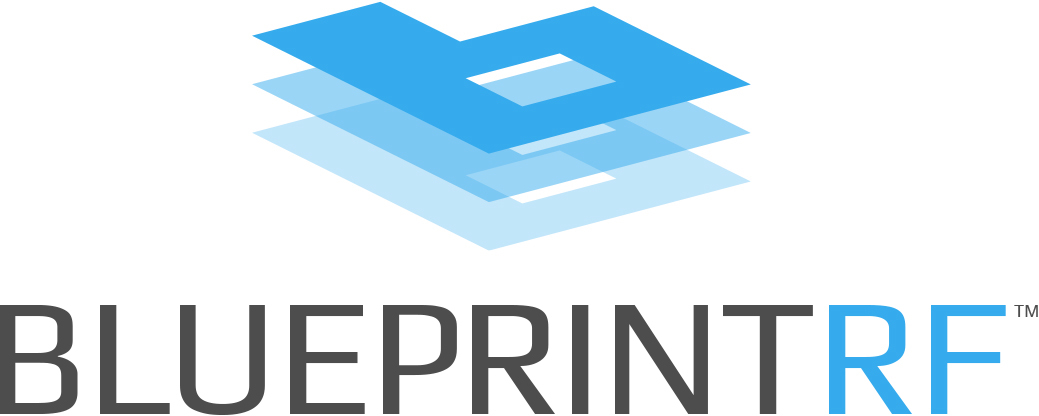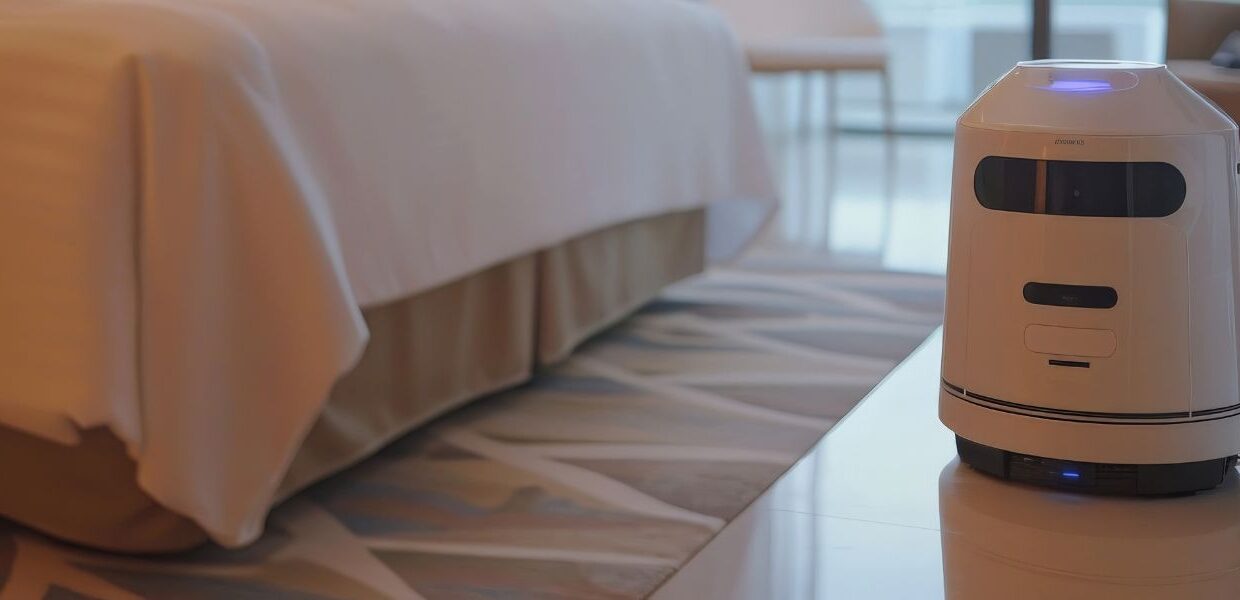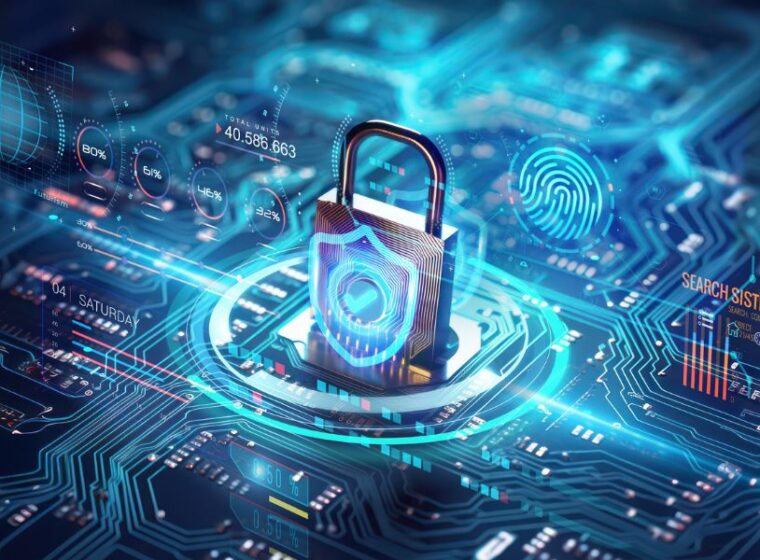Just like the Roomba has revolutionized cleaning at home, hotels have increasingly adopted housekeeping technology for many reasons. Housekeeping is one of the most manual and labor-intensive departments in hotels, standing to benefit from innovation.
Compared to hotel desk jobs, housekeeping is characterized by time-consuming, laborious roles riddled with psychological stress due to time pressures and immense workloads. On top of all that, the monotonous nature of the duties coupled with relatively low pay often leads to high turnover rates.
So, how does the analog role of a housekeeper evolve with the guidance of technology? With high-speed WiFi connectivity as the backbone, integrating housekeeping technology in hotels can improve operational efficiency, reduce costs, and ultimately enhance guest satisfaction.
Service Robots
Service robots are a revolutionary new technology in hotel housekeeping. These machines automate routine tasks such as delivering linens and amenities, thereby allowing staff to focus on more complex responsibilities. Additionally, service robots operate around the clock, improving operational efficiency during peak occupancy periods.
Equipped with advanced sensors, service robots minimize human error, ensuring timely and accurate service — crucial for maintaining high standards of guest satisfaction. In turn, by alleviating the physical demands on housekeeping staff, service robots contribute to better job satisfaction and lower turnover rates.
The effectiveness of service robots is heavily dependent on a robust hotel WiFi infrastructure. Reliable connectivity is essential for these robots to communicate with other systems, navigate efficiently, and receive real-time updates. By integrating hotel housekeeping technology like service robots into their operations, hotels can not only boost efficiency and reduce costs but also position themselves at the forefront of hospitality innovation, ultimately enhancing the overall guest experience.
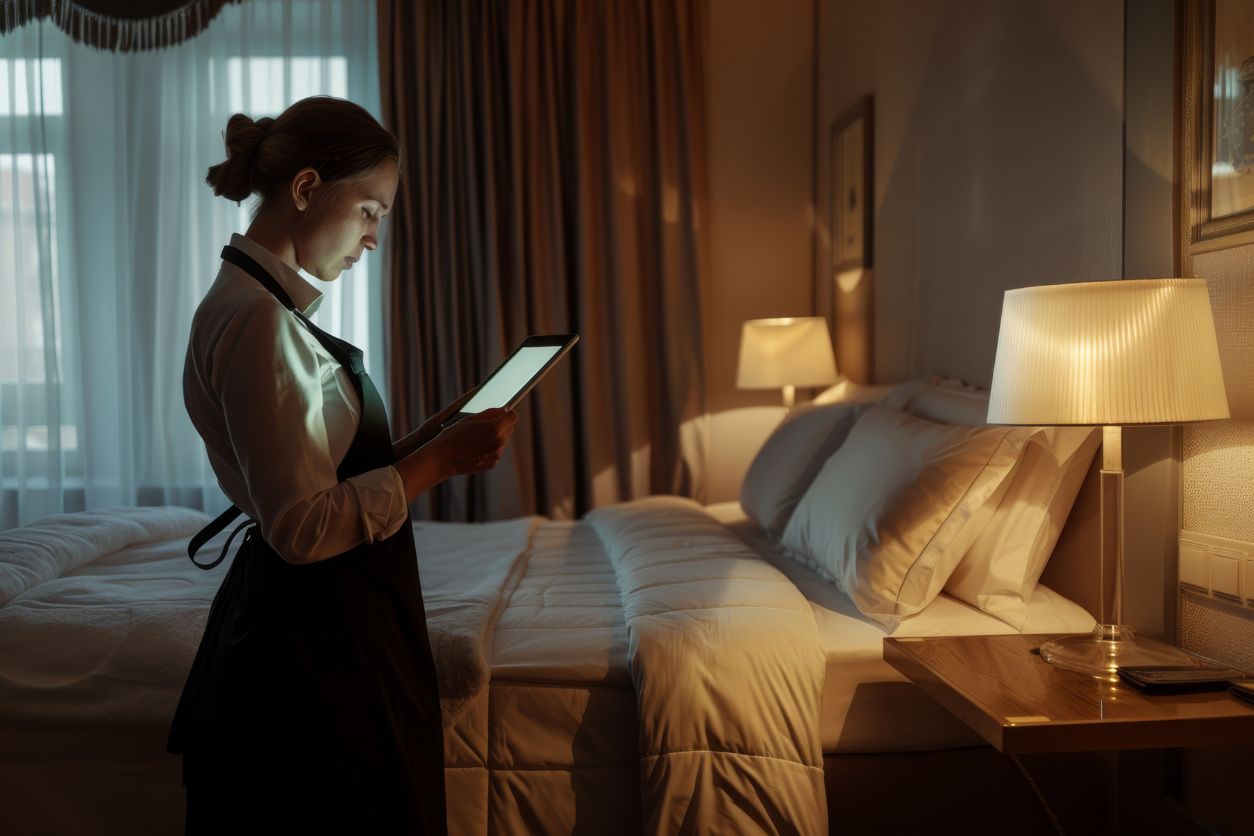
PMS-Integrated Mobile Apps
Housekeeping is often one of the most inefficient departments in hotels, largely due to its reliance on manual processes and paper-based systems. Using mobile apps, hotels can streamline operations and enhance communication. These apps allow housekeepers to log into the hotel’s Property Management System (PMS) from any mobile device, providing real-time updates on room status and cleaning tasks.
By automating task assignments and sending push notifications, mobile apps help ensure that staff are always aware of their responsibilities and can prioritize tasks effectively, reducing bottlenecks and improving the efficiency of housekeeping operations. The integration of mobile apps with PMS platforms also enhances resource planning and workload management. Managers can easily assign tasks, track progress, and make data-driven decisions to optimize staff deployment.
Using these apps both reduces the likelihood of human error and improves staff morale by providing clear communication and reducing the physical strain of managing paper-based systems. Altogether, PMS-integrated mobile apps streamline coordination with other departments, such as the front desk, ensuring that rooms are ready for guests promptly.
IoT-Enabled Automation
IoT-enabled automation helps alleviate several time-consuming manual housekeeping tasks. By integrating advanced technologies such as Artificial Intelligence (AI) and Internet of Things (IoT), hotels can make strides to improve operational efficiency and optimize resource allocation. Here are some key technologies that fall under this umbrella:
- AI: Artificial intelligence can be used to analyze guest check-in and check-out data to optimize housekeeping schedules and routes. In turn, this can minimize downtime while maximizing productivity by ensuring that rooms are cleaned efficiently.
- Internet of Things (IoT) Devices: Investments like smart thermostats, automated lighting systems, and room condition monitoring can take the burdens off housekeeping staff while automatically reducing energy consumption and contributing to sustainability efforts.
- Predictive Maintenance: These technologies utilize connected devices to alert staff about potential issues before they escalate, preventing disruptions and ensuring an exceptional guest experience.
Hotel automation systems and smart technologies can be bandwidth-consuming investments. Establishing the proper WiFi and network coverage is vital to ensure the performance of such upgrades.
Sustainability Solutions
As sustainability becomes a central focus in the hospitality industry, hotels are adopting technology-driven solutions to minimize their environmental impact, particularly in housekeeping. Here are some key sustainability best practices and initiatives being integrated into operations:
- Eco-Friendly Cleaning Products: Hotels are transitioning to biodegradable and non-toxic cleaning products that are safer for the environment and healthier for guests and staff, reducing harmful chemical runoff.
- Water and Energy Conservation Technologies: Installing low-flow showerheads and faucets helps conserve water without compromising comfort. Similarly, utilizing energy-efficient vacuum cleaners and washing machines reduces electricity consumption.
- Smart Room Sensors: These devices monitor occupancy and automatically adjust lighting, heating, and cooling, conserving energy and reducing the carbon footprint.
- Waste Reduction Initiatives: Implementing recycling programs and reducing single-use plastics in guest amenities help minimize waste. Digital solutions can also replace paper-based processes.
- Linen and Towel Reuse Programs: Encouraging guests to reuse linens and towels can lead to significant water and energy savings, supported by educational materials highlighting the environmental benefits.
With the help of these sustainability solutions, hotels can boost their operational efficiency while promoting a responsible and eco-conscious brand image, ultimately driving guest loyalty and satisfaction.
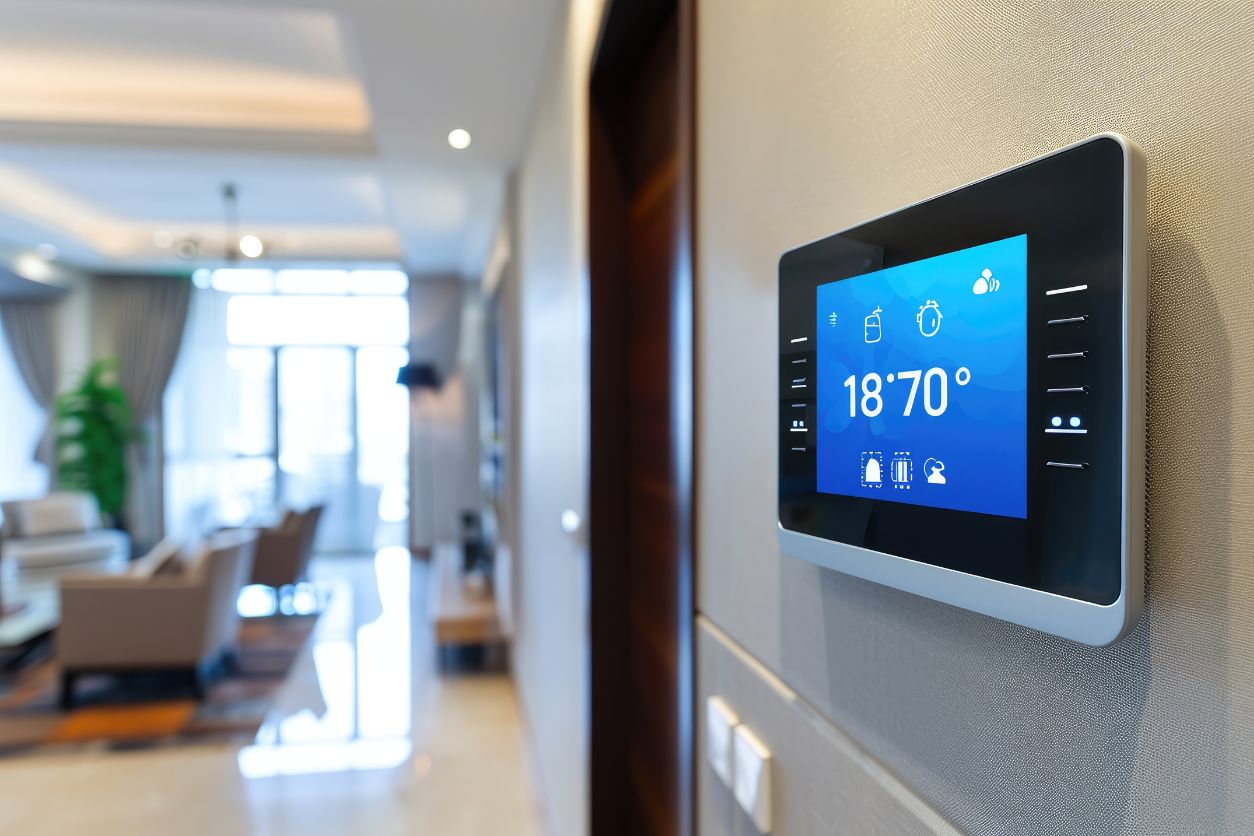
Smart Room Sensors
Smart room sensors are having a positive impact on the way housekeeping operates in hotels by providing real-time data on room occupancy. Rather than knocking on doors to make sure guests aren’t around, housekeeping staff can minimize downtime in maintaining cleaning schedules and reduce unnecessary disruptions to guests. Smart room sensors also help regulate environmental factors such as temperature, lighting, and humidity, ensuring a comfortable atmosphere while promoting energy conservation.
By identifying issues like elevated humidity levels, smart sensors facilitate proactive maintenance, allowing hotels to address potential problems before they escalate. Smart sensors can also integrate with guest profiles — automatically adjusting settings to align with individual guest preferences.
Supporting Your Investment in Hotel Housekeeping Technology
In the dynamic world of hospitality, embracing hotel housekeeping technology is no longer optional; it is essential for staying competitive for guests. These technology investments streamline hotel housekeeping processes and align with sustainability goals, ensuring that hotels can offer both eco-friendly and personalized experiences.
To fully realize the potential of new technology in hotel housekeeping, robust and reliable hotel WiFi solutions are essential. This is where Blueprint RF comes in as a dependable partner, providing high-performance connectivity solutions tailored to the unique needs of the hospitality industry. By partnering with Blueprint RF, hotels can confidently invest in cutting-edge technology, knowing they have the support to deliver seamless and innovative guest experiences. Contact us today.

